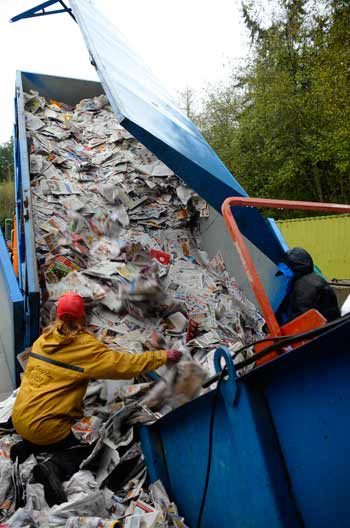The fate of a curbside recycling plan for Island Disposal customers will likely be decided at a meeting this week.
The Island County Commissioners will hold a public hearing on a level of service ordinance that would result in curbside service for all of the waste-hauler’s customers in Langley and rural areas of Whidbey. The hearing is at 1 p.m., Dec. 20 in the commissioners’ Hearing Room, 1 NE 6th St., Coupeville.
The proposal, which would establish a nearly identical program to one considered in 2007, has seen a range of reaction from the public — support from those who want curbside service and criticism from those who believe the program is too expensive or will be inefficient.
Among the latest concerns is how the prospective program would affect Island Recycling, a privately owned company that’s been in business on South Whidbey for more than 33 years.
At a recent Langley City Council meeting, elected officials agreed to support the county’s plan in 4-1 vote but joined a chorus of community concerns about what would happen to the long-time Freeland company.
“There is hardly any doubt it wouldn’t impact them initially,” Mayor Larry Kwarsick said. “I don’t know how it couldn’t.”
According to owners Dave and Jill Campbell, the county’s curbside plans may result in some changes or hardships for their business but they don’t believe it will be a death sentence.
That’s not to say that they endorse the proposal. They don’t. In fact, the couple is adamantly against it but have been reluctant to voice their opinion publicly for fear of it being taken as “sour grapes.”
Their objections are not against curbside recycling as a practice; it works well in many places. And while it “has to start sometime” in Island County, Dave Campbell said Whidbey isn’t quite ready.
“Curbside’s a great idea but I don’t think we’re there yet,” he said. “We don’t have the population density.”
To establish a curbside program, the commissioners plan to adopt a level of service ordinance that requires Island Disposal, the county’s franchised hauler, to offer the service.
Earlier this year, the company said it could provide every other week service for $11.60 but only if the fee is applied to all of its existing customers. People could still cancel their service and no customers would be forced to sign up.
The program would work by providing each customer with a large bin in which a range of recyclables could be tossed. The only major exception and the deal breaker for many on-the-fence-supporters is glass.
Island County Recycle Coordinator Jerry Mingo said the plan will help the county raise its current recycle rate of about 30 percent — a figure the Campbells debate — to rival that of the state’s nearly 50 percent average.
But the Campbells question whether the benefits of the curbside plan would really outweigh the environmental cons of using a fleet of gas-guzzling trucks to collect on an island with sparse density.
Also, Island Disposal lacks a sorting facility on Whidbey Island and will have to truck un-compacted recyclables all the way to Renton.
The Campbells also truck recyclables off island but they compact it first, which they say is much more efficient and carbon-footprint friendly as it reduces the number of trips.
“We’re not anti-recycling … we’re pro environment,” Jill Campbell said.
A similar argument was voiced by Commissioner Kelly Emerson when the plan was first discussed in November. She said she didn’t agree this was necessarily the best plan to move forward.
Dave Bonvouloir, solid waste manager for Island County, could not be reached for this story but he reported that a recent carbon footprint study for Whidbey demonstrated that “there was no question” a combined subscription curbside program would result in the biggest carbon emission reduction for the county.
The Campbells remain unconvinced of the wisdom of the plan.
“It’s not going to be the silver bullet they think it is,” Dave Campbell said.



